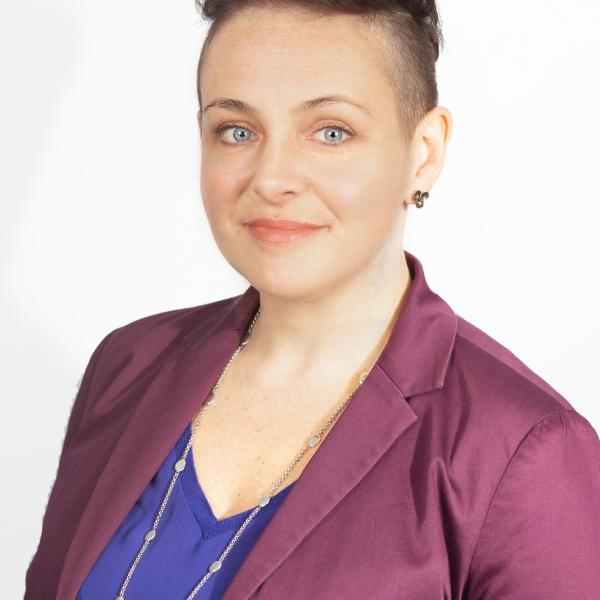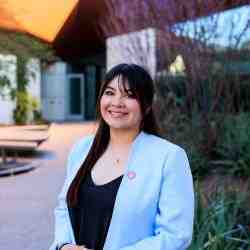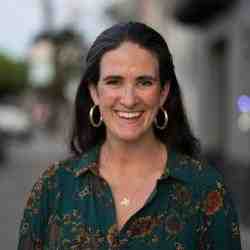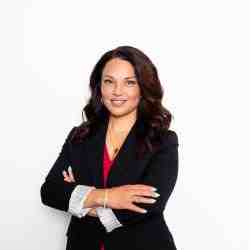Introducción
Diana is expanding the legal and cultural definition of “family” – and proving that a more inclusive approach can help everyone.
La idea nueva
The nuclear family model may no longer be the norm in the US (less than one-fifth of families fit the mold of two adults living with their minor children), but it's still the basis for social and economic benefits like health care, tax breaks and citizenship. Lawyer and LGBTQIA+ advocate Diana Adams believes that all families, regardless of biological relationship or legal marriage, are deserving of equal rights and recognition. Diana is expanding the legal and cultural definition of “family” – and proving that a more inclusive approach can help everyone (including and especially kids, who benefit from stable adult relationships).
In 2017, Diana founded Chosen Family Law Center (CFLC), a non-profit committed to building the legal frameworks to support dignity and justice for all family types (such as same-sex couples, single people, platonic co-parents, multi-partner or multigenerational families). CFLC is the only non-profit in the US addressing the source of the problems for non-nuclear families: unsupportive policy, uninformed professionals who aren’t culturally competent to serve them, and a culture that doesn’t relate to them. They do this through legislative development, education, and direct legal services for those in need.
Marriage is a key place to intervene: US laws uphold the idea that there is one ideal family form and treat unmarried people as lesser citizens (despite the fact that fewer than half of American adults are married). Diana is working to separate the 1,000+ benefits currently tied to marriage to ensure that nuptials aren’t the only gateway to a social and economic safety net. Academics and social scientists were the first to pick up these questions and have raised many issues about constraints of the “one nuclear family fits all” approach in the US. Diana is taking these lessons directly to legislators, drafting and proposing policy changes, organizing communities to advocate for policy reform, protecting families and individuals at-risk, and successfully passing laws -- like the first multiple partner domestic partnership ordinance in the country, which passed in Somerville, MA in 2020 -- that changed the situation for the majority of the American population. While chipping away at local and federal policy reform, Diana is also working with major employers (like tech companies and academic institutions) and their employees to change important benefits (like health insurance) to adhere to a more inclusive definition of family. These creative collaborations are demonstrating the need for and viability of formalizing a new definition of family that reflects the way culture has been moving for decades.
A lack of basic rights and protections means that non-nuclear families and individuals are more likely to live in poverty than those who are married. Diana and the CFLC team work directly with low-income clients to protect and formalize chosen family commitments – through a process that not only validates other family constellations, but which reduces the likelihood of future conflicts and provides stability for adults and children. In addition to filling a gap for thousands of people who would otherwise have no legal representation, Diana is ensuring that more people are serving these communities. CFLC is building the pipeline and increasing expertise among decision-makers by training lawyers, mental health professionals, and judges in new, inclusive methods.
As a globally renowned expert in chosen family and LGBTQIA+ issues, Diana is a voice for a more inclusive concept of family that will make relationships and communities more resilient, increase stability for kids and parents, and afford basic rights and protections to all citizens. Despite increasing polarization and urgent threats to bodily autonomy for women and the LGBTQIA+ community, of which Diana is a part, their message is being well-received across party lines and prompting unlikely collaborations among seemingly disparate identities and political groups.
El problema
Current “family policy” over relies on marriage and fails to support the myriad forms of family as they exist. This means that the majority of American adults who aren’t married (such as single people, intergenerational care arrangements, LGBTQIA+ families, platonic co-parents, polyamorous families, etc.) are left out of the benefits of legal marriage (over 1,000 in federal law) such as tax-free inheritance and health insurance coverage -- and are often socially marginalized despite being the majority. Across society – from family memberships at the YMCA to a cell phone “family plan” -- the unmarked “normal” is a mom, dad, and kids.
A lack of social recognition and legal protections makes these communities more vulnerable to the ups and downs of a life lived without a safety net – they are more likely to experience poverty, adverse health outcomes, housing insecurity, and social isolation. Certain groups invested in the preservation of the nuclear family have tried to use these vulnerabilities as evidence of the moral sanctity and stabilizing nature of marriage itself, rather than the legal and cultural benefits that come with it. In addition to larger economic and health outcomes, these thousand “missing rights” have a huge impact on daily life – parentage for non-biological parents is in question, or grandparents who are parenting their grandchildren, lifelong unmarried partners can’t visit one another on their deathbed, loving, stable co-parents are denied the ability to adopt, etc.
Extended family networks of mutual support have been the norm throughout human history – and we’re suffering now without them, especially the 38% of US adults who don’t live with a romantic partner, and the many overwhelmed parents (and particularly mothers) who can’t afford to recreate a village of support with paid help. In addition, the US is suffering an epidemic of loneliness. In a 2023 Gallup poll, 17% of adults reported daily feelings of loneliness, which Diana believes is related to the isolation of the nuclear family as well as the many people outside of it who feel disconnected.
The nuclear family is a relatively new development that emerged during the industrial revolution to support a working dad and a dependent, homemaker mom. In purely statistical terms, its popularity peaked in the 50s and 60s (women were encouraged to leave the workforce post WWII), but it hasn’t been the most common family form before or since. During those times, and still in much of the rest of the world, households tend to be larger, more intergenerational, with more support built in. On top of that, wealthy countries the world over – with the exception of the US – provide families a social safety net (such as paid maternity leave and universal healthcare). In the US, the safety net is not between citizen and state, but envisioned as being between spouses.
The story of the nuclear family, along with policy’s emphasis on marriage, has historical ties to religious influence on politics, attempts to control women’s sexuality and reproduction outside of marriage, our nation’s resistance to supporting mothers and families with a social welfare (as other nations have), and attempts to prevent interracial births. Even mainstream progressive thinkers will discuss the poverty of single mothers and suggest that the solution is to save the family and encourage marriage. This narrative has been pushed for decades, and continues today, despite a wealth of research showing that financial incentives keep people, especially women, in unhappy and abusive marriages. In a 2023 US News and World Report survey of women in abusive relationships, 34% cited lack of money or financial dependence on a partner as one of their reasons for staying.
Furthermore, there is no evidence proving that the nuclear family model is the best one. Instead, research has consistently shown that children need stability of parental figures, which Diana’s model for chosen family agreements would help to improve.
Diana defines family as “people who are committed to be there for each other no matter what, this includes chosen family regardless of biological relationship or legal marriage.” Many Black families in the US have chosen family arrangements with aunties and uncles of no biological relationship, but a commitment to one another and the children involved. Countless LGBTQIA+ people create chosen family when they are rejected by their family of origin. But we are so culturally accustomed to the idea that marriage is a stabilizing solution that we’ve lost sight of other options. Culture is shifting, traditional definitions of family are in flux, and the law has not caught up.
The supreme court decision to legalize gay marriage in 2015 was a major victory. However, one of the debates within the movement, and understood consequences of pushing for legalization was that it further emphasized marriage as the primary means for public legitimacy and for benefits. In fact, a study conducted in 2020 showed that only half of gay couples chose to get married. Instead of ‘why shouldn’t [specific group of people] have the right to be married?’, Diana is moving us toward a new question – why should anyone be denied basic rights – married or not?
La estrategia
Diana is creating the legal framework to expand the definition of family and ensure that everyone is afforded the rights that are currently tied to marriage. Diana’s strategy includes direct legal representation for non-nuclear families and individuals, policy drafting and passage of laws that protect underserved family structures, building a national network of expertise, and increasing public awareness and imagination.
I. Direct representation:
CFLC is the first and only legal services non-profit organization in the country to provide free legal services to low-income non-nuclear and underserved family forms, including platonic co-parents, multi-parent families, same-sex parents, intergenerational families, caretakers of disabled individuals, and known sperm donor arrangements. CFLC also provides services for transgender people and LGBTQIA+ asylum seekers.
CFLC’s legal support programs are innovative and lifesaving, meeting critical needs for clients who wouldn’t otherwise have access. CFLC accepts clients with a household income at 250% or less of the federal poverty level. Services are fully free and pro bono. Some examples include: family formation documents for platonic and polyamorous partners, parentage petitions for non-biological parents, prenuptial agreements, known sperm donor agreements, and green card paperwork for LGBTQIA+ asylees fleeing persecution or torture.
Diana’s model for chosen family commitments is based on the idea that designing family structures requires clear written agreements, especially if children are involved. Clients are guided through a process to ensure that each person’s intentions and desires are articulated, aligned and ultimately reflected in the design of their own legal agreements. This process protects relationships and strengthens chosen families. For example, Diana often works with lesbian couples and a male friend who wants to donate sperm. Diana helps the couple figure out whether they want their friend to be a “co-parent” or a “sperm donor” before creating a legal framework for their arrangement. Diana has found that these early discussions around difficult, important issues prevent future conflict much more powerfully than a legal agreement alone. Without this intentional process, Diana has seen too much ambiguity, which puts strain on relationships, and increases the likelihood of future conflicts and instability, all of which have negative impacts on children.
For over 30 years, domestic partnerships have been used by same sex couples but also by best friends and siblings, which allows some of the rights afforded by marriage, such as shared health insurance, tax incentives, hospital visits, etc. When supporting polyamorous families of 3 or 4 people, Diana sometimes uses existing legal structures – like trusts or LLCs – that allow groups of people to share property and finances without any question as to their romantic relationship. An LLC can allow a polyamorous triad to share real estate, pay taxes together, share health insurance, and have clear exit strategies that protect everyone involved.
II. Policy drafting and passage:
Only 18% of households in the US reflect what US policy recognizes and rewards as a family. This means the vast majority of Americans have found for themselves (or are seeking) other ways to secure the things that families in the broadest sense promise: a sense of belonging, a sharing of life's ups and downs, and commitments to caring for each other emotionally and financially. Adult cohabitating siblings, multi-family households, single parent homes, and intergenerational families all fall outside "the norm." So too do groups of more than two committed, loving adults in arrangements referred to generally as "polyamorous."
Diana has seen that, when relationships have legal status, it reduces discrimination and promotes social awareness and acceptance. When it comes to policy change, Diana is taking lessons learned from the marriage equality movement and focusing on two powerful entry points: anti-discrimination and domestic partnership.
Diana cofounded the Polyamory Legal Advocacy Coalition (PLAC) with Harvard’s LGBTQ+ Legal Advocacy clinic. In 2020, the Coalition drafted and passed the first historic multi-partner domestic partnership ordinances in Somerville, Massachusetts, and later in two other Massachusetts cities. They also passed the first family structure non-discrimination law in the US in Somerville & Cambridge, MA, with Berkeley & Oakland, CA poised to pass in February 2024. PLAC is currently working on passing these ordinances at a city level in NY state and then a state level policy for multi-person domestic partnership in New York.
These policies not only enhance public awareness and acknowledgment but also have a ripple effect on other policies by establishing a "basis in law”. In a recent case in NYC, the definition of “family member” for the purposes of rent-stabilized apartment succession was changed to Diana’s more inclusive definition. Two bases were cited: the laws passed on multi-partner domestic partnership in MA, and media interviews that Diana had done that had impacted the judge hearing the case.
After proving out policy changes at the local and state levels, Diana will shift their focus to federal level reforms. They are also working with corporations to adopt new definitions of family. While state and federal laws lag behind culture, well-resourced corporations hold a lot of power in experimenting with more inclusive definitions of family for benefits like health insurance. Ultimately, Diana wants to decouple benefits from marriage -- to ensure that all citizens have a safety net, and that marriage is no longer the gateway to economic and social privilege.
III. Building Network of Expertise:
While CFLC serves low-income clients in NYC and the Hudson Valley area, they are also building a national professional referral network of lawyers and mental health professionals who are trained to serve this community. In 2024, CFLC is launching Continuing Legal Education classes and training materials, after Diana and their Senior Legal Director at CFLC Andy Izenson have been sought after CLE educators for other organizations including the American Bar Association for years. Throughout the year, the team takes on interns from top law schools to learn about their innovative practices and support their direct service work with low-income clients. To-date, they have worked with approximately 200 interns, and that number is increasing every year.
In addition to national coalition building, training, and coordination among lawyers and other service providers, Diana is building a global movement of expertise. While living in Germany, Diana founded and directed the Euro LGBTQ Family Law Institute. To this day, Diana works with groups across the globe, especially in countries where LGBTQ lives and freedoms are being threatened. In June of 2023, Diana presented to the European Parliament at the Pride Conference in Madrid. In the US, Diana has presented to the Biden Administration regarding their efforts to address increasingly urgent threats to LGBTQIA+ families.
IV. Public Education and Advocacy
Diana is a national and global voice for a more inclusive definition of family and the steps to get us there. As these policies take root, awareness about chosen family arrangements is increasing. Through frequent media engagements, Diana is helping to educate the public about alternatives and, in so doing, decrease internalized shame among the majority of Americans who don't fit into the nuclear family model. In a moment of increasing polarization in the US, including on LGBTQIA+ issues and reproductive rights, Diana is building powerful coalitions between unlikely allies – including feminist groups, single people, LGBTQIA+ communities, and advocates for children.
In five years, Diana hopes to see several states with state-wide domestic partnership programs, and laws allowing people to create a legal family relationship with more than one person and with a person who may not be a romantic partner. Ultimately, though, Diana sees domestic partnerships as a steppingstone and only one part of the solution. Success will look like an informed and aware public who understands that we shouldn’t be getting our financial security, health insurance, or government benefits via our relationships, but instead we should be receiving this level of support no matter what. Diana sees their ultimate work as changing the narrative about poverty – shifting from the current tenor of ‘encourage marriage’ to a world that has supports for parents and universal health care, allowing people the freedom to choose families out of a desire for connection rather than a need for security.
La persona
Diana grew up in a Christian family in rural New York. Surrounded by poverty, they saw how women were compelled into abusive and unhappy marriages with men for financial security -- including Diana’s own mother and grandmother -- as well as the suffering of single mothers. From a young age, Diana saw adults around her failing to take action and set out to fix what needed fixing. In elementary school, a local power plant was polluting the community’s drinking water, so Diana wrote a song about it and performed on local news. They led fundraising efforts to build a playground. At the age of 10, Diana’s schoolmate got pregnant as a result of sexual assault and was shamed by the community. Diana traveled to the closest bookstore in Albany, NY, and asked for resources on sex and health -- a request they would fulfill many more times as Diana became the local source for health information. Diana’s father was a leader of the conservative anti-abortion group, Right to Life, which held meetings in their kitchen, so Diana became an informant for Planned Parenthood. As an undergraduate at Yale, they helped improve policies around financial aid so that low-income students like Diana wouldn’t be saddled with debt upon graduation. They also helped start one of the first “mommunes” -- a cooperative of single mothers sharing resources and care.
After graduating from law school, Diana focused on issues of domestic violence and poverty. During those years, Diana came out as bisexual and later as gender nonbinary, and as a result, most of their blood relations cut off contact.
As a young lawyer starting their own practice, Diana was diagnosed with cervical cancer and discovered they’d been duped into purchasing a health insurance policy with no cancer coverage. Desperate for support, Diana reached out to their community of friends and found that many were eager to actively support one another. Chosen family saved Diana’s life, but under US law, these same people wouldn’t be allowed to visit them in the hospital. This sharpened Diana’s commitment to ensuring that all families, including chosen families, have the legal right to care for one another.
Diana is a serial entrepreneur who has founded dozens of organizations, including several prominent ones in the LGBTQIA+ legal space. In addition to co-founding PLAC with colleagues at Harvard, they co-founded BiLaw, the bisexual lawyers’ community, which has submitted amicus briefs to the Supreme Court, and BiPlus Organizing US, a policy organization for bisexuals in the LGBTQIA+ community. In September 2022, they spoke to the Biden Administration with BiPlus for Celebrate Bisexuality Day. Diana founded the Euro LGBTQ Family Law Institute to create the first network of lawyers across Europe supporting LGBTQ family rights and which has collaborated with the EU Human Rights Commission. Today, Diana coordinates the network of lawyers in the US and Europe and is involved in the development of a worldwide network.



